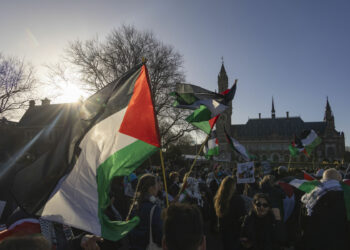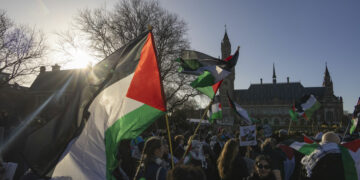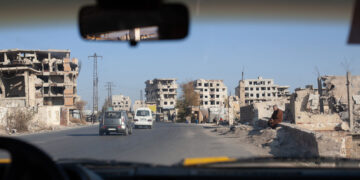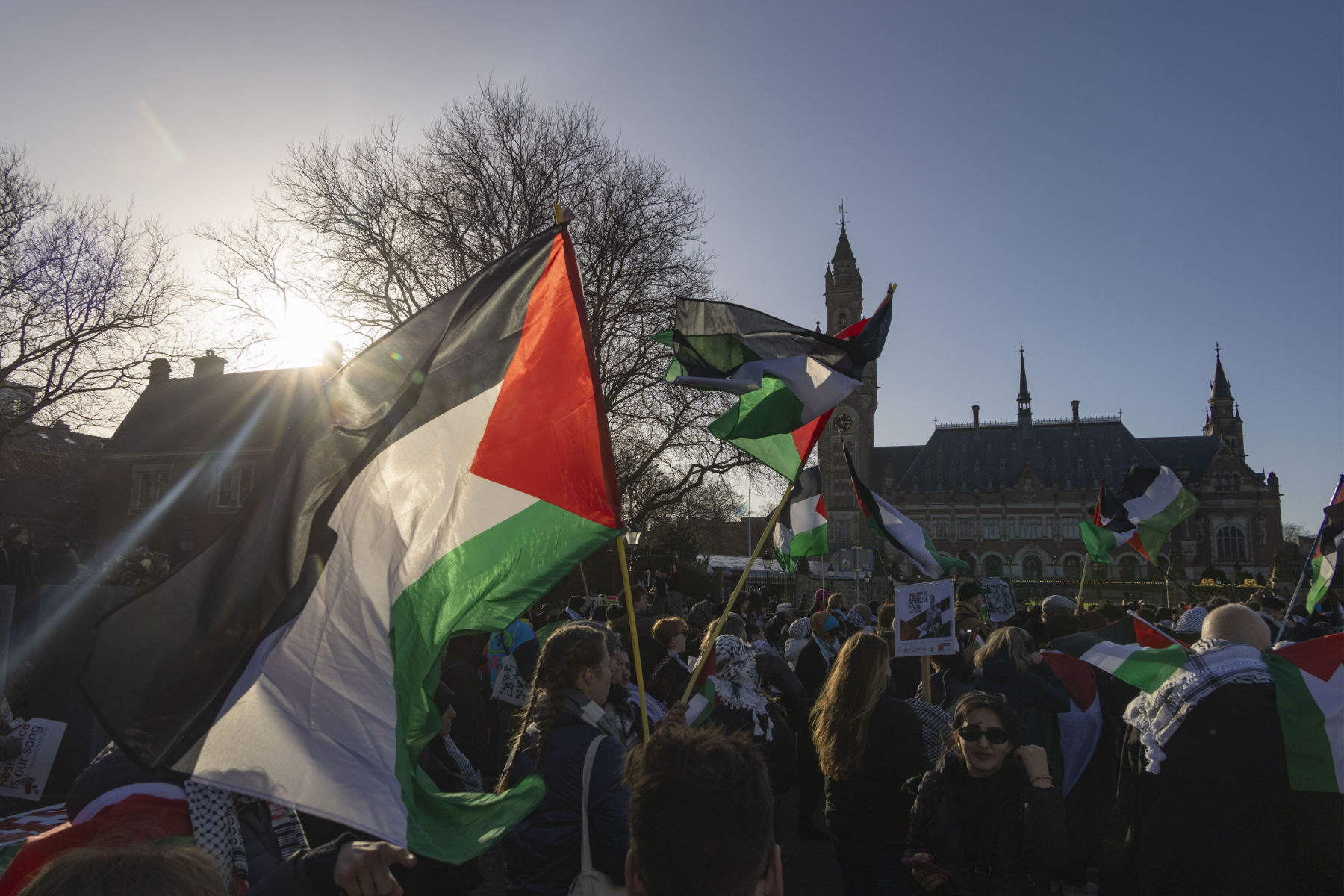Noha Aboueldahab is an assistant professor at Georgetown University in Qatar, where she teaches courses on international law and transitional justice. She is also a senior non-resident fellow at the Middle East Council on Global Affairs, and was previously a fellow and non-resident fellow at the Brookings Institution.
The illegal, U.S.-led invasion of Iraq 20 years ago cannot be extricated from the deeper, darker history that helped set the stage for it: the devastating economic sanctions against Iraq throughout the 1990s, imposed by the United Nations Security Council after Iraq's invasion of Kuwait. Designed to cripple Saddam Hussein's regime, the sanctions over 13 years instead destroyed the lives and livelihoods of so many innocent Iraqis—the very people who, had they been given the chance, could have helped shape the Iraq that they wanted.
The sanctions created conditions that bolstered Saddam's dictatorial hold on power while effectively crushing any possibility for Iraqi-led resistance against him. Rather than help rebuild the health and education sectors and other basic services needed to sustain Iraqi society after the first Gulf War—the progress of which the sanctions destroyed—the United States and the United Kingdom instead pressed ahead with an all-out invasion and occupation of Iraq in 2003 that destabilized the country and the entire region.
The devastation of the 1990s sanctions, then, ensured that any post-Saddam government would be decided not by Iraqis, but by a U.S.-led foreign intervention. "Operation Iraqi Freedom," as the U.S. military called the invasion and occupation—despite its illegality under international law—came on the backs of a population that was already too crushed by sanctions to have a role in Iraq's future.
To better understand and prevent a repeat of anything that would resemble Iraq in the 1990s, as well as the ensuing 2003 invasion and its disastrous aftermath, a reckoning with the decisions and actions that led to the sanctions is crucial, even decades later.
This reckoning should include an apology by the U.N. for its role in, first, failing to prevent the deadly consequences of its sanctions on Iraq, but second, continuing to impose them throughout the late 1990s despite multiple and credible reports detailing their horrific impact on innocent Iraqis. The absence of U.N. authorization for the invasion of Iraq in 2003 does not absolve the institution of its role in perpetrating a humanitarian catastrophe in the 13 years that preceded it.
The U.N., along with the U.S. and the U.K., should also establish a reparations and compensation fund and put in place clear and time-bound policies to repair and compensate for the damage they have done in Iraq for decades. They each have a responsibility to pursue reparative justice for Iraqis, whose already immense suffering throughout the 1990s was compounded even more by the 2003 invasion and occupation.
The devastation of the sanctions throughout the 1990s ensured that any post-Saddam government would be decided not by Iraqis, but by a U.S.-led foreign intervention.
- Noha Aboueldahab
The sanctions were set in motion following U.N. Security Council Resolution 661, adopted four days after Iraq's invasion of Kuwait in 1990. The U.S. and the U.K. were the two main architects of the sanctions policy, while the backing of the U.N. lent legitimacy to their economic warfare against Iraq. The consequences of the U.N.'s failure to protect the lives of Iraqis from sanctions that "may well lay claim to be the worst humanitarian catastrophe ever imposed in the name of global governance," in the words of scholar Joy Gordon, still haunt Iraq and the region today. Any faith in the U.N.'s mission to protect fundamental human rights, dignity, justice and social progress was shattered not only by its failure to live up to these ideals throughout the 1990s, but also by its complicity in bringing about the "scourge of war" that the U.N., in its own charter, claims it is determined to save humanity from.
The extent of the humanitarian catastrophe that the sanctions caused are still felt and seen today, 33 years since they were imposed and 20 years since they ended. While debates periodically re-emerge over the exact number of Iraqi children, women and men who died as a direct result of the sanctions, they do not negate the fact that the sanctions caused mass death and destruction with long-term, devastating effects on Iraq.
UNICEF reported, for example, that the mortality rate for children under 5 more than doubled during the sanctions regime, largely because of hunger and disease. Infant mortality rates also more than doubled. As UNICEF noted, "if the substantial reduction in child mortality throughout Iraq during the 1980s had continued through the 1990s, there would have been half a million fewer deaths of children under-five in the country as a whole during the eight year period 1991 to 1998." In other words, 500,000 Iraqi children died because of sanctions.
Malnutrition and disease, a plummeting literacy rate, and overall destruction of basic sanitation, health, education and other social services led to miserable living conditions for Iraqis, many of whom were professionals forced out of their jobs. "We are in the process of destroying an entire society," Denis Halliday, the U.N. humanitarian coordinator for Iraq at the time, said when he resigned in protest of the sanctions policy in 1998. "It is as simple and terrifying as that."
While the sanctions regime prevented the rebuilding of Iraq's infrastructure, which had been largely destroyed by U.S. bombing campaigns in the first Gulf War, Iraq was also being bombed regularly throughout the 1990s and up to the 2003 invasion—as the U.S. and the U.K. enforced their "no-fly zones" over northern and southern Iraq. In 1998, they conducted Operation Desert Fox, bombing nearly 100 sites in Iraq, with the objective of neutralizing Iraq's ability to produce weapons of mass destruction.
The infamous oil-for-food program, an attempt by the U.N. Security Council to ease the suffering of Iraqis as a result of the sanctions, added insult to injury. The program aimed to put in place a process by which Iraq could sell its oil to be able to pay for humanitarian supplies it so badly needed. But the program was marred by corruption. It also required that 30 percent of the revenue generated through it be diverted to the U.N. Compensation Commission in Geneva, which was tasked with administering financial compensation to claimants—individuals, companies and states—who suffered from Iraq's invasion of Kuwait in 1990. The UNCC eventually collected $52.4 billion from Iraq as compensation for 1.5 million claimants. The last installment was paid in 2022.
The 20th anniversary of the invasion of Iraq is a moment not only for serious reflection on the war's history and legacy, but also for a reckoning with the atrocities committed against Iraqis in the long, cruel run-up to the invasion.
- Noha Aboueldahab
As an organization that claims to maintain international peace, security and justice, the U.N. must apologize for its deadly role in facilitating the indiscriminate sanctions regime against Iraq. Not only would an apology send a message to the world—and to Iraqis in particular—that the U.N. is able to acknowledge when it was complicit in violating its own charter, it would also demonstrate that the U.N. recognizes its own responsibility in one of the world's worst humanitarian catastrophes, whose effects have lasted for decades. Given the magnitude of the destruction from sanctions authorized by the Security Council, this apology should come from the U.N. secretary general himself.
The U.N. should also establish a reparations and compensation fund to begin to repair, or at least symbolically compensate, Iraqis for the livelihoods it was complicit in destroying. A mechanism for reparations is crucial if the U.N. is to regain credibility.
The ultimate masters of the sanctions—the U.S. and the U.K.—must also be held accountable. They should establish their own reparations and compensation fund that both American and British governments pay into, in order to repair and compensate for their roles in mass violations of the most fundamental human rights in Iraq, from the cruel sanctions regime of the 1990s through the end of the Coalition Provisional Authority's rule in Baghdad in 2004.
This reparations initiative would serve, at the very least, as an acknowledgement of the inexcusable harms wrought by these brutal sanctions, as well as the incessant efforts by American and British governments to block any easing of the sanctions despite evidence of their ruinous impact in Iraq. Clearly, since the U.S. and the U.K. supported the U.N. Compensation Commission, through which Iraq had to pay $52 billion in reparations for its invasion of Kuwait, they must strongly believe in the importance of compensation. They should do the same for the millions of Iraqis who have been, and continue to be, affected by decades of American- and British-led injustices.
The 20th anniversary of the invasion of Iraq is a moment not only for serious reflection on the war's history and legacy, but also for a reckoning with the atrocities committed against Iraqis in the long, cruel run-up to the invasion. Iraqis deserve reparative justice.






































